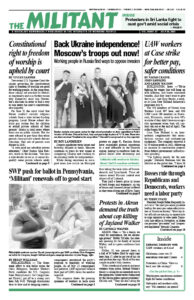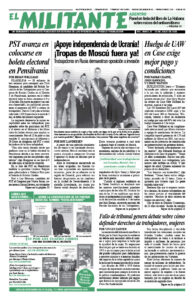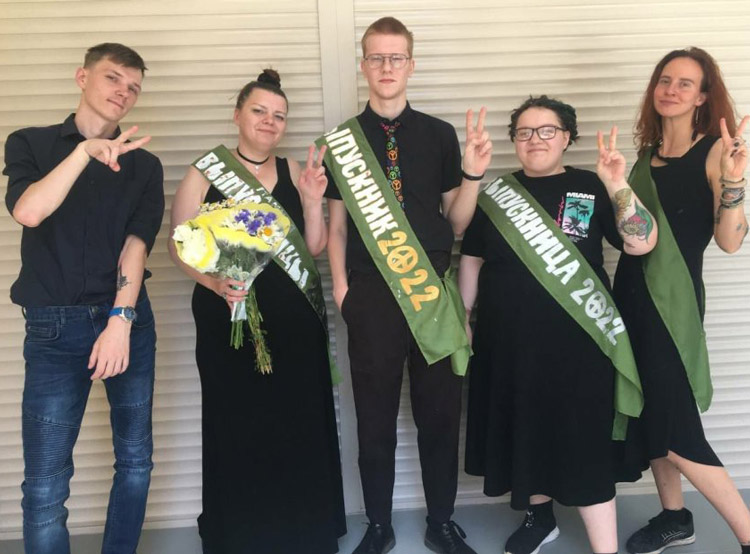Despite significant troop losses and festering disquiet at home, Moscow continues to press its war aimed at conquering Ukraine and crushing its decadeslong battle for independence.
While facing resistance in occupied areas (see article on Mariupol protest), Russian forces have suspended ground operations in a new offensive in the Donetsk region, hoping to reinforce their depleted forces after destroying and then taking the twin cities of Severodonetsk and Lysychansk. These advances meant Russian control over almost all of Luhansk.
They paid a heavy price in losses of both troops and weaponry, on top of losses and demoralization suffered as they were driven out of Kyiv, Sumy and Kharkiv by fierce Ukrainian resistance earlier in the war.
“As the Stalinist regime in the Soviet Union collapsed in face of massive popular mobilizations at the beginnings of the 1990s, Ukraine was one of 14 former republics to declare national independence,” a March 3 statement by Jack Barnes, national secretary of the Socialist Workers Party, explains. “Now Putin’s regime is ruthlessly seeking to claw back, under Moscow’s hegemony, those nations incarcerated in the czarist prison house of nations, regenerating the Russian empire today with Putin as its czar.”
The statement is widely used by SWP members and supporters, along with weekly Militant coverage, to campaign in defense of Ukrainian sovereignty and to demand Russian troops get out.
Despite Moscow’s “pause,” highly destructive and deadly shelling and missile strikes targeting civilian areas in cities and towns across Ukraine continue. This paves the way for a renewed Russian push for territory in Donetsk at the same time that it punishes Ukrainian workers and farmers for their resistance all across the country.

Faced with an inability to recruit Ukrainians to staff pro-Russian local government structures in Kherson and other conquered areas in the south of Ukraine, President Vladimir Putin has been forced to send in Russian political police operatives and other officials while taking steps to integrate the conquered territory into Russia.
The difficulties Moscow faces have been acknowledged by none other than veteran Russian commander Igor Girkin, who, under the alias Igor Strelkov, served as defense minister of the Russian puppet Donetsk People’s Republic in 2014. The Ukrainian military, he wrote on Telegram, dragged out the battles in Luhansk “with the aim of gaining as much time as possible and inflicting maximum losses on the Russian strike force.” Then it “managed to withdraw the core of its defending troops, avoiding the encirclement of even a small part of them.”
Russian forces have failed to break Ukrainian military capacity, he says. On the contrary, he admits, Moscow’s difficulties in raising fresh troops mean that it is Russian capacity that is at risk of being worn down completely.
Anger in Russia over casualties
After at least five Russian soldiers were killed by Ukrainian artillery in the first week of July, their mothers spoke out, blaming pro-Kremlin media for revealing their locations. The letter was sent to the local Committee of Soldiers Mothers in the Astrakhan region of southern Russia where their sons’ unit is based.
The Russian army desperately needs more soldiers but Putin is loathe to formally declare war on Ukraine, which is necessary for him to impose a national draft. He insists on calling his invasion a “special military operation” and has made it a crime in Russia to call it a war.
Instead, Moscow is promising big cash bonuses for volunteers, reservists and mercenaries. It is especially recruiting from impoverished ethnic minority regions of Russia.
Some young Russian men are refusing to answer this year’s annual conscription summons.
Krill, 26, an information technology worker from southern Russia who asked Reuters not to use his surname, said he hasn’t responded to calls from the military. “The people in Ukraine are like brothers,” he said. “I know many people in the country and I can’t support these actions.”
Capitalist rulers from Germany to Japan to Australia are rearming as Moscow’s invasion — the largest land war in Europe since World War II — announced a new stage in the growing imperialist world disorder. As the war in Ukraine continues far longer than most imperialist “friends of Ukraine” anticipated, shifting alliances and rifts among rival imperialist powers seeking a road to defend their own markets and profits are coming to the fore.
Wider tensions were on display as the foreign ministers of the Group of 20 industrialized nations met in Bali, Indonesia, July 8. Washington failed to get several major semicolonial countries to follow its lead on sanctions against Russia, which fall heaviest on working people there.
Referring to the war in Ukraine, Indonesian Foreign Minister Retno Marsudi said, “It has become more difficult for the world to sit together.”
The rulers of Germany, France and Italy are pushing Kyiv to seek talks to end this war, even if it means concessions to Putin’s terms. To further pressure these powers, Moscow cut off its gas supplies to Europe July 11, citing a need for “maintenance work.”
Opinion pieces in liberal papers like the New York Times and Washington Post cover their own desire for an end to Ukrainian resistance by complaining about workers’ low attention span and how they’re increasingly suffering from “war fatigue.” These articles urge the Joseph Biden administration to look for ways to put pressure on the Ukrainian government.
Belarus tensions over Moscow’s war
Moscow also has difficulties with some of its allies. Even before the war began, Belarus President Alexander Lukashenko allowed Russian troops to operate in and from Belarusian territory. His regime has given Russian forces “full control” of an airfield in the Gomel region, less than 20 miles from the Ukraine-Belarus border.
But Lukashenko now faces opposition from senior Special Forces officers, who wrote an open letter to him, the July 9 Express reported. They rejected deeper Belarusian involvement in Moscow’s war, saying it would make the country “an international outcast.”
Insisting that “the Belarus Republic” should maintain “full authority on its own territory” and over foreign policy, the officers wrote, “Russia’s occupation of the internationally recognized territory of Ukraine, which is [a] friend of our state” is an “attempt to pull Belarus into a completely unprovoked war against a sovereign state.”


